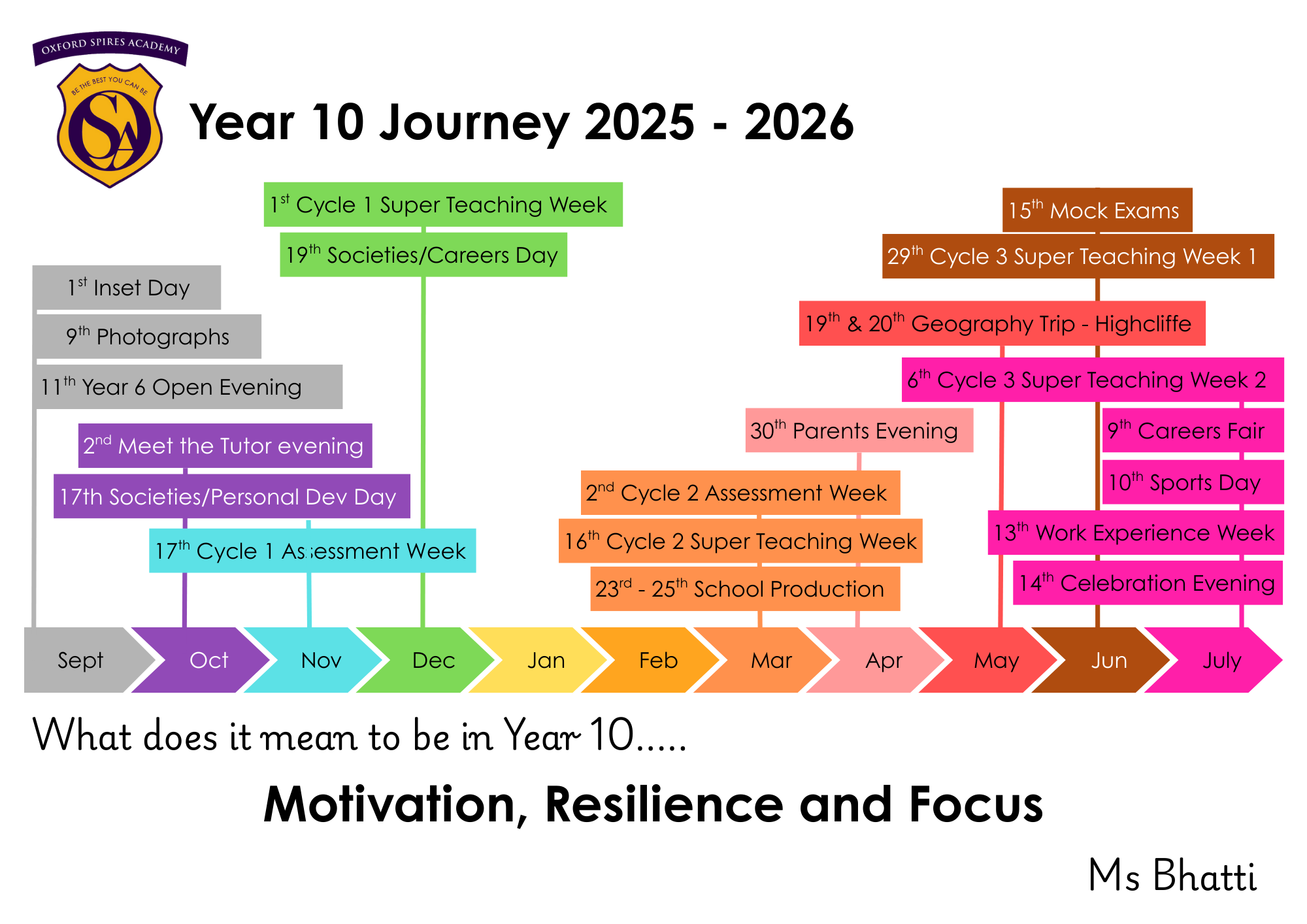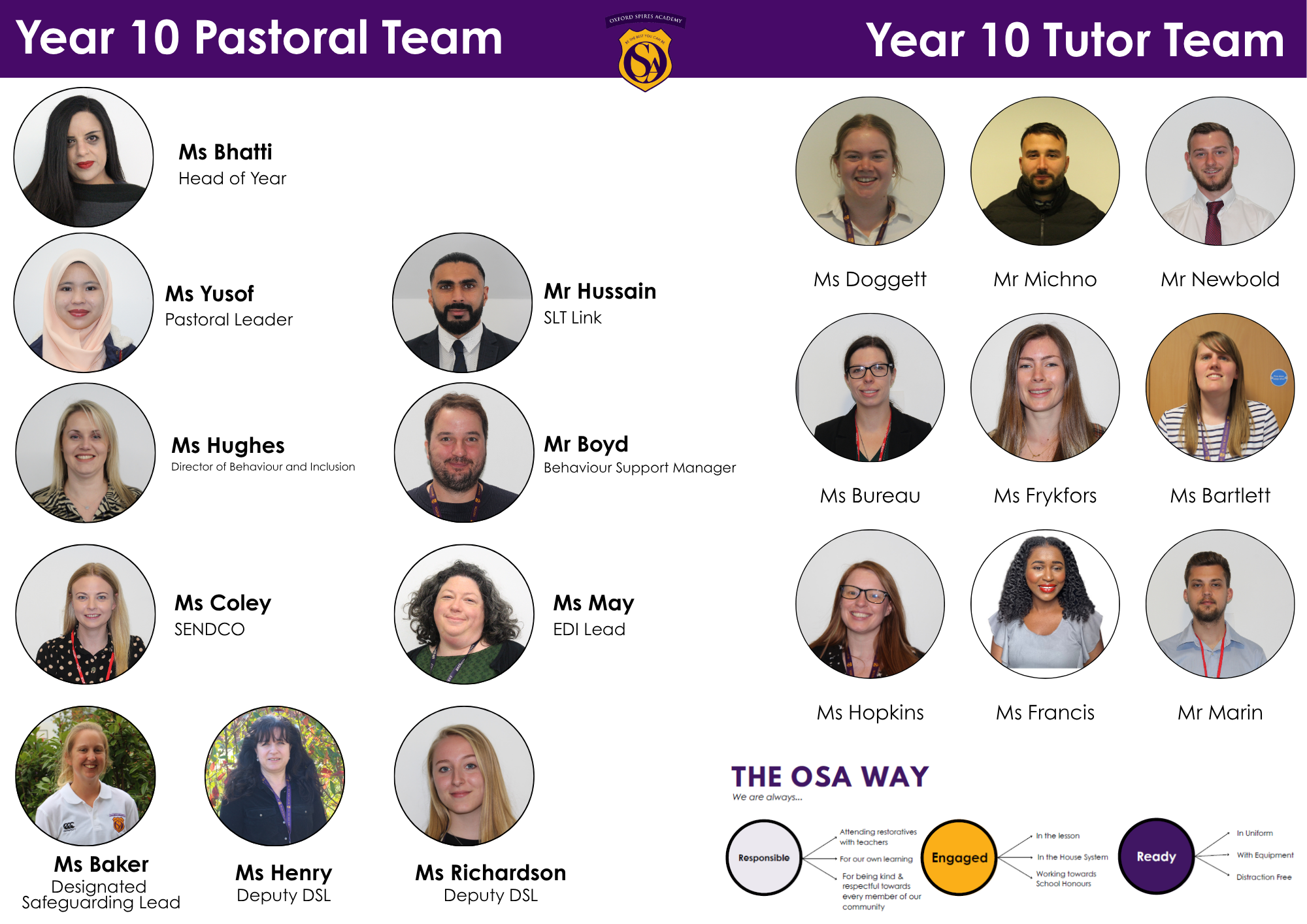Years 7-11
Year 10

Year 10 Assessment
Schools are places of learning and achievement. We measure our success by our students’ success. In an ever-growing complex world, our children need the qualifications, skills and tenacity to live happy and fulfilled lives.
In week 11 all students will sit an assessment in each taught subject area. This allows us to measure how well our students are learning the taught curriculum. These results will be reported home to parents and carers.
- All students in Year 10 will have three assessments across the academic year.
- Throughout Year 10 assessments will increasingly align with a full GCSE exam paper.
- In cycle 3 all Year 10 will sit formal GCSE mock exams to prepare for the national exams they will sit at the end of Year 11.
- In week 9 of each cycle students will receive a timetable of when each assessment will be held this will also be published below:
Supporting your child in Year 10
We are all aware that the stresses and strains on young people are different to those we may have experienced at school ourselves, with new exam specifications and social media pressures adding to the usual complexities of being a teenager in Britain.
Students know that Year 10 will be more challenging and we will do everything we can to enable them to be happy, engaged and as stress-free as possible. You may find this link on teaching mindfulness to teenagers useful:
http://www.huffingtonpost.com/sarah-rudell-beach-/teaching-mindfulness-to-teenagers_b_5696247.html
Please also support your child by letting them know they can talk to you about their feelings and helping them to address any concerns or questions they may have. It may not always be easy to find the right time to talk; if they do open up to you, it’s worth grabbing the opportunity while you can.
The workload will certainly become more intense in Year 10. Students will be set 1 hour of work for each subject, and on occasion there may be more depending on some coursework deadlines. It’s really important that students get used to the routine of sitting and working independently each evening, in preparation for the demands of years 10 and 11 and beyond.
We suggest students in this age group spend a maximum of 2hrs per evening studying; this could be spent on homework, reviewing notes or reading around the subject. For example, if your child is reading a novel or play they have been recommended by their English teacher that is thematically linked to a text they are studying, this could be included in this time
The following routine may help your child manage their time more effectively:
SEAS – Study, Eat, Activity, Sleep
Set a time for HOMEWORK so it doesn’t take over the whole evening
Set aside time for a MEAL and, whenever possible, eat with them and catch up with their day.
Set some time for ACTIVITIES OR RELAXING whether it’s going for a run, stretching, playing games or spending time online with friends.
Set a regular, agreed BEDTIME and make sure there are no phones or electronics in the room.
You may also find the following tips useful in helping to keep your child motivated:
- Agree a balance between work and social life and stick to the agreement. Flexibility is the key – if a special night comes up, agree that they can make up the work at a specified time
- All students fall behind, feel demotivated or overwhelmed, or struggle with the balance of social, work and school demands at times. When your child feels like this, berating and threatening them will have a negative effect. Talk to them about the issues, acknowledge their feelings and adopt a sensible attitude in helping them find a solution.
- Be flexible – use the 80/20 rule. If your child is sticking to what they are supposed to be doing 80% of the time, that’s a great start.
- If your child asks for your support, encourage them by helping them to see the difficulties in perspective. Teenagers often take an all or nothing approach to difficulties – “I’ve messed up this essay, I might as well give up.” Try and help them see the bigger picture and remind them that setbacks are often temporary and usually resolvable.
The OSA Cycle
- The academic calendar is split into three cycles of learning.
- Each learning cycle is twelve weeks long.
- Students will following a carefully sequenced and ambitious curriculum during weeks 1-10.
Week 10 - Assessment Week
- All students will sit a formal assessment in week 10.
- Student achievement will be reported back to parents and carers.
Our assessment principles:
- Students are tested on the content taught from the cycle and detailed in the Scholars Guide
-
Section A & B : Knowledge - teacher will read the assessment aloud and using a visualiser
Section A will focus on knowledge taught from the cycle of learning just completed. Section B will focus on knowledge taught in previous cycles in that academic year
- Section C : Application - students will answer independently
Week 12 - Super Teaching Week
What is super teaching week?
Super Teaching Week is where teaching teams use the data from assessment week (Week 10) to identify gaps in knowledge and common misconceptions. Teachers then deliver lessons that target these areas to ensure mastery and edit their schemes of learning for future year groups so that we can teach it BETTER. Each lesson is done in purple pen to show that this is development work and we use a summative sticker in students' books for students to mark the end of each Cycle's learning.
Why is super teaching week important?
At Oxord Spires we passionate that no child should be left behind and Super Teaching Week is the vehicle we use to explicitly ensure all students from all backgrounds, in all subjects, in all classrooms have the opportunity to master and develop their learning. We also believe that no scheme of learning is perfect and we enjoy reflecting and changing our practice for our students. ‘Getting better is the exciting part’.
The OSA Scholars Guide
Scholar’s Guides are our way of communicating our knowledge rich curriculum to parents and carers and a tool to complement the work done in classrooms every day. Scholar’s Guides develop students to master core knowledge and skills quickly so that teachers can push them further later.
By making knowledge and skills clear via Scholar’s Guides, students and parents can support learning from home, especially when preparing for the week 10 assessments.
Scholar’s Guides can be used by SEND departments and teaching assistants to preteach students who may require it and to target interventions and re teaching effectively. Some students may require more support and scaffolding but Scholar’s Guide means that every student has access to ambitious lessons planned from an aligned, sequenced curriculum and we avoid denial of knowledge!
See the attachment below for an overview of the specifications and exam boards students follow in all subjects.

